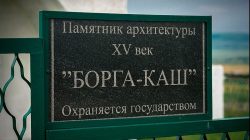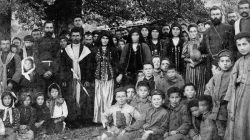
GEORGIA, WHICH NEVER LEARNS ITS LESSON; RUSSIA, WHICH STARTS TO FOREESEE ITS FUTURE; CONGRATULATIONS TO ABKHAZIA AND SOUTH OSSETIA; AND A CALL FOR THE CAUCASIAN PEOPLES
The war that broke out in the Caucasus directs the attention, nolens volens, to the historical course of the past Caucasian wars. Although Russian Tsars realized that they had to get involved in all kinds of machinations and use military force at any rate to bring the Caucasian region under their rule if they wanted to make their way through the hot seas to here, the Caucasian peoples refused to yield to the vast, imperial powers of Russian Tsars as they gathered around their leaders to remain free—a point which meant far more significance to them than earning their bread did.
As is well known, the bloodiest and longest Caucasian wars were focused on Dagestan because it has linked the Caucasian region to the south. Although Russian Tsars never succeeded completely in their attempts to mobilize their army of up to 500 000 troops, whether overland or by sea, and despite constant supplies of logistic support that it received, this war that started almost three hundred years ago still continues even today either overtly or clandestinely.
The longest and bloodiest phase of the Caucasian wars of independence is what can be called the phase of Imams—specifically the phases of Imam Mansur, Imam Ghazi Muhammad, Imam Hamzat and Imam Shamil. The longest one of them is the phase of Imam Shamil that lasted for more than a quarter of a century.
It is unfortunate that the Caucasian peoples could not duly recognize the opportunity of independence, and hence missed it, although Imam Shamil, a man with great strengths of character, had made superhuman efforts in self-denial to make it available for them to take. It was not only the Caucasian peoples; even the administrations of the neighbouring Muslim countries such as the Ottoman Empire, Iran and Egypt made the same mistake and left the Caucasian peoples face to face with the vast powers of imperial Tsars who were supported by European crusaders.
Though he was left alone, Imam Shamil did not give up and remained firm in his fighting. He assigned Muhammad Emin, one of his distinguished disciples, a task in the west of Caucasus so that it could be united with its east—something that had similarly happened in Dagestan and Chechnya. His brilliant idea of getting the west of Caucasus to take joint action with its east failed because the Ottoman rulers of the 1839 period collaborated with the Western Crusaders—something that the separatists and pro-Russians in the west of Caucasus had longed for…
In spite of all those problems and his state of being isolated from the world, Imam Shamil managed to keep Dagestan and Chechnya as a nightmare for the Tsars for over a quarter of a century. It so happened, at times, that even Tsar Nicholas II could not help expressing his fear that he would be awakened one morning by the sound of Imam Shamil’s horse whinnying in the courtyard of his palace.
Imam Shamil was able to challenge the Russians mind-bogglingly; the Russians could, however, resist him only in the long run because they had to refresh their forces with unremitting support of logistics.
Imam Shamil suffered heavy casualties when he lost his uncle, his sister and his wife in the battle of Ahulgoh, one of those grimmest wars. Although Imam Shamil acted in accordance with the treaty of the war and allowed his son of six or seven, Jamaladdin, to be kept captive by the Russians to end the war, the then Russian Tsar did not keep his promise and sent him to the capital city of Russia. Trained in military schools as a commissioned officer, Jamaladdin began to serve in Tsar’s troop of guardsmen. After 15 years, his brother Ghazi Muhammad and some of his stout friends invited the Russian troops to their own country. They agreed to be covered by the Russian patronage and entered Georgia, which was then protected by Russia. They managed to take Princess Annet Chavchade and his brother Orbelian out of Zinandal, the name for the heavily guarded women’s quarters in the home of Gen. David Chavchadze, and rode them on pillion seats to the headquarters of Imam Shamil. Georgia did not then know what to do, and Russia was helpless. Russian authorities told Imam Shamil that they would pay as much as he demanded to release the hostages. In return for the release of the hostages, he only wanted to see his son Jamaladdin, whom he had not seen for over 15 years. The Russian Tsar helplessly had to agree to Imam Shamil’s demand to save the Georgian prince and princess.
Imam Shamil had warned several times the Georgian authorities who allowed Tsar’s forces to enter their territories that the whole of Georgia would unavoidably be invaded if the Russian forces occupied the Caucasus. Georgian Prince David heard the following historic words from Imam Shamil after he came over to the Caucasus to exchange Imam Shamil’s son Jamaladdin for his sister and brother:
“At every turn I met with your refusal to devote your forces to the good of the Caucasus. I hope that this painful experience will encourage you to do service for your own nation.”
The Georgian prince was angry at this proposal of Imam Shamil, but he kept silent. After one and a half century, which is historically a short period of time, the Georgians have today declared the Russians to be their worst enemy and sought patronage from the United States as well as from European countries. If the Unites States breaks up and the European Unions dissolves tomorrow, which country or countries will Georgia call on for protection?
Georgian leader has been hoodwinked by the United States and the European Union
The United States seeks to penetrate the Caucasus one way or another. Just as Russian Tsars sought to invade the Caucasus in the past so that they could exert their influence over the southern regions, now the United States seeks to secure its way into the Central Asia by gaining control over the indispensably strategic significance of the Caucasian route, which will enable it to control the sources of energy in the Central Asia and even also to interfere with China. It is a plain fact that the United States has put into service tens of its technical facilities in countries such as Azerbaijan, Georgia, Armenia and even Turkey to this end.
It is clear that the United States has encouraged the Georgian leader, Mikheil Saakashvili, to solve his problems—that is to say—to annex Abkhazia and South Ossetia, if he wanted to gain accession to the European Union. When Armenia invaded Karabakh, part of the Azerbaijani territory, neither the United States nor any one of the European countries voiced opposition to it; quite the contrary, they supported Armenia. To the voice of Turkey, nobody listened, because it was deprived of its voice. The whole situation was left to the ‘mercy’ of the crusading Organization for Security and Cooperation in Europe (OSCE). In other words, the lamb was consigned to the wolf. The wolf bred after it began to inhabit this soil. Trying to throw them out would now doubtlessly contradict the OSCE’s definition of the ‘human’ as well as ‘animal’ rights.
It is this group of crusaders that beguiled the young leader of Georgia in order to enter the Caucasus. The people of Georgia have once more been deceived by their own leader. The United States and the European Union encouraged him, with false promises to stand by him, to attack South Ossetia and Abkhazia. The consequences of Georgian incursion would eventually enable both the United States and the European Union to be far more influential in Georgia, just as the September 11 attacks enabled the United States to invade and plunder not only the whole of Iraq aside but also Pakistan, Afghanistan, and the entire Turkic Republics in the Central Asia. The Georgian leader would be tricked into annexing South Ossetia first, and this would be followed by his launch of a new series of attacks against Abkhazia. And he did just hat he said he would. He attacked South Ossetia, ravaged Tskhinval, and left thousands of Caucasians either dead or injured. And the Kremlin ordered the Russian troops to defend South Ossetia because it sought to take the most advantage of America’s greed by acting promptly. The whole of Caucasian guerrillas simultaneously sided with their brothers in both South Ossetia and Abkhazia. How can they ever fail to think that their possibly successful invasion would eventually cost them a lot? Unless Russia intervened, their invasion would doubtlessly be an entirely different one. However, when Russia fought against the Georgian forces, they were able to help Ossetia push the Georgian forces back. It recognized their independence and declared its recognition of them as independent countries to the rest of the world. And it even demanded that they should be recognized by other countries of the world as well.
By so doing, Russia has demonstrated that the Caucasian peoples and their territories were of great importance to it. While Russia was formerly the age-old and great enemy of Abkhazia and South Ossetia, it now appears to be an irony of the history for the whole world to see that Russia has become one of their trustworthy neighbours as well as one of their noble allies. The question has arisen as to whether Russia has changed its policies on the Caucasian region, because it displayed both political and military support for Abkhazia and South Ossetia in order to demonstrate the level of significance that it attaches to the Caucasian republics. While the world is changing in every possible direction, Russia cannot be thought to remain the same, of course. While both Europe and the United States have taken evident action to bring the Caucasia under their hegemonic control, Russia cannot just sit around and do nothing.
What encouraged Georgia to invade and annex Abkhazia and South Ossetia are the material aid and spiritual support that came from Europe and the United States. It is obvious that Georgia’s invasion of Abkhazia is aimed first at cutting Russia’s ties off from the Black Sea and then at putting an end to Russia’s sovereignty over the Caspian Sea. If Russia loses its influence over the Black Sea and the Caspian Sea altogether, this means that it will lose its arteries as well. For this reason simply, the Kremlin considers it vital that the Caucasian peoples and republics should remain intact. While Russia is siding with Abkhazia and South Ossetia and is recognizing their independence, it is actually taking action to guarantee its independence. Whether this is considered as the kind of action taken as a consequence of Russia’s willingness to maintain good affairs with Abkhazia and South Ossetia or as the kind of action taken by Russia to guarantee its future independence, it is to be thought of as the sort of action that is good, sound and prescient, because it will keep the neighbours together. This is, however, not sufficient to help Russia to guarantee its future. As soon as Russia’s recognition of Abkhazia and South Ossetia is followed by its decision to recognize and to call on the rest of the world to recognize Dagestan, Chechnya, North Ossetia, Kabardino-Balkaria, Karachay-Cherkessia and Adygea, it will save itself from great harm which will be inflicted by possibly catastrophic events to take place in the future along its southern frontiers. Russia will be heavily armoured with the formation of the Independent State of North Caucasian Republic—a political entity that will emerge from North Caucasian republics as they join together. Additionally, there is no doubt that Russia will risk nothing while it will greatly benefit from its economic as well as political collaboration with the Caucasus—something that will win it a trustworthy partner in the future. The world states struggle for continued existence by forming new partnerships. Russia is expected to extend its historic recognition of Abkhazia and South Ossetia to the rest of the Caucasus. This will take Russia to the forefront of the world politics in the end. The Russian authorities must, therefore, reflect carefully on this opportunity and concentrate on bringing their future steps to a conclusion. Can it ever be called life to stay constantly on pins and needles? It is a fact that it is and will be in vain forever to resist something that is not worth resisting at all. Russia will definitely benefit from its prevention of any kinds of loss and instability, from its efforts to maintain social peacefulness as well as to take the pain away from the mothers…
Russia’s move towards a greater, united Caucasus provides crystal clear evidence that three hundred years of failure to settle fossilized disputes will be overcome. Respect for others’ territorial integrity, for their values of civilization as well as of culture, and for their affairs with their neighbours will, without a doubt, lessen the pains of the Russians on the one hand and increase their wealth and happiness on the other hand. Isn’t it, after all, one of the goals that the government officials set themselves to make their people happy and well off?
When Russia backs up the idea of setting up an independent body of North Caucasian republics, this will actually improve Russia’s prestige that the Central Asian Turkic republics have attached to it so far. Additionally, Russia will be able to stop the United States and the European Union from playing further tricks on it because neither the United States nor the European Union will be able to prolong their imperialist policies any more. It is without a doubt that the Kremlin will defeat the United States in its chess game if it recognizes the formation of a Confederate State of North Caucasus. The Kremlin mustn’t miss this opportunity.
e-mail: [email protected]
Cafer Barlas







